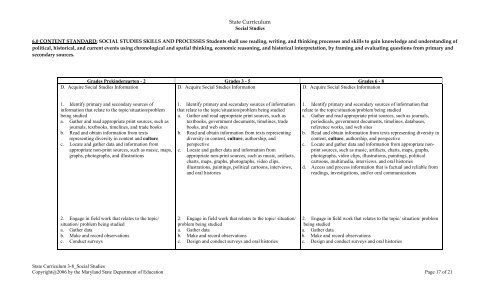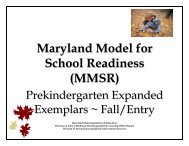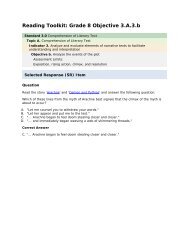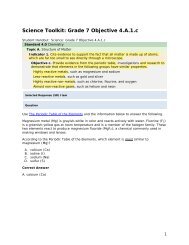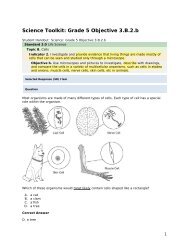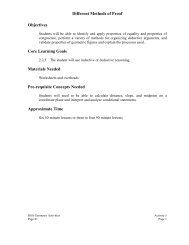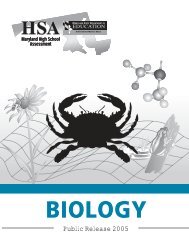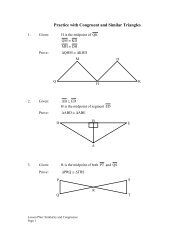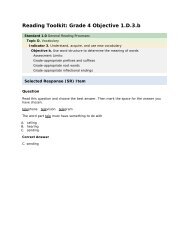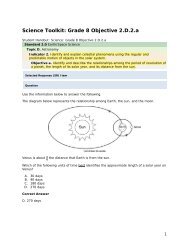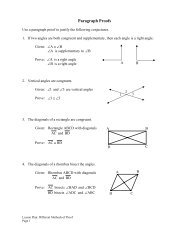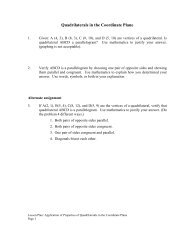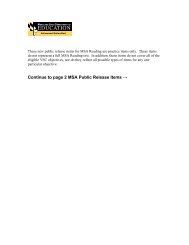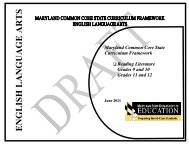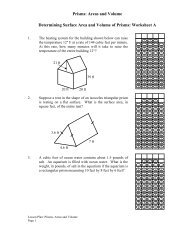Maryland State Curriculum - mdk12
Maryland State Curriculum - mdk12
Maryland State Curriculum - mdk12
- TAGS
- maryland
- curriculum
- mdk12.org
You also want an ePaper? Increase the reach of your titles
YUMPU automatically turns print PDFs into web optimized ePapers that Google loves.
<strong>State</strong> <strong>Curriculum</strong><br />
Social Studies<br />
6.0 CONTENT STANDARD: SOCIAL STUDIES SKILLS AND PROCESSES Students shall use reading, writing, and thinking processes and skills to gain knowledge and understanding of<br />
political, historical, and current events using chronological and spatial thinking, economic reasoning, and historical interpretation, by framing and evaluating questions from primary and<br />
secondary sources.<br />
Grades Prekindergarten - 2 Grades 3 - 5 Grades 6 - 8<br />
D. Acquire Social Studies Information<br />
D. Acquire Social Studies Information<br />
D. Acquire Social Studies Information<br />
1. Identify primary and secondary sources of<br />
information that relate to the topic/situation/problem<br />
being studied<br />
a. Gather and read appropriate print sources, such as<br />
journals, textbooks, timelines, and trade books<br />
b. Read and obtain information from texts<br />
representing diversity in content and culture<br />
c. Locate and gather data and information from<br />
appropriate non-print sources, such as music, maps,<br />
graphs, photographs, and illustrations<br />
2. Engage in field work that relates to the topic/<br />
situation/ problem being studied<br />
a. Gather data<br />
b. Make and record observations<br />
c. Conduct surveys<br />
1. Identify primary and secondary sources of information<br />
that relate to the topic/situation/problem being studied<br />
a. Gather and read appropriate print sources, such as<br />
textbooks, government documents, timelines, trade<br />
books, and web sites<br />
b. Read and obtain information from texts representing<br />
diversity in content, culture, authorship, and<br />
perspective<br />
c. Locate and gather data and information from<br />
appropriate non-print sources, such as music, artifacts,<br />
charts, maps, graphs, photographs, video clips,<br />
illustrations, paintings, political cartoons, interviews,<br />
and oral histories<br />
2. Engage in field work that relates to the topic/ situation/<br />
problem being studied<br />
a. Gather data<br />
b. Make and record observations<br />
c. Design and conduct surveys and oral histories<br />
1. Identify primary and secondary sources of information that<br />
relate to the topic/situation/problem being studied<br />
a. Gather and read appropriate print sources, such as journals,<br />
periodicals, government documents, timelines, databases,<br />
reference works, and web sites<br />
b. Read and obtain information from texts representing diversity in<br />
content, culture, authorship, and perspective<br />
c. Locate and gather data and information from appropriate nonprint<br />
sources, such as music, artifacts, charts, maps, graphs,<br />
photographs, video clips, illustrations, paintings, political<br />
cartoons, multimedia, interviews, and oral histories<br />
d. Access and process information that is factual and reliable from<br />
readings, investigations, and/or oral communications<br />
2. Engage in field work that relates to the topic/ situation/ problem<br />
being studied<br />
a. Gather data<br />
b. Make and record observations<br />
c. Design and conduct surveys and oral histories<br />
<strong>State</strong> <strong>Curriculum</strong> 3-8_Social Studies<br />
Copyright@2006 by the <strong>Maryland</strong> <strong>State</strong> Department of Education Page 17 of 21


